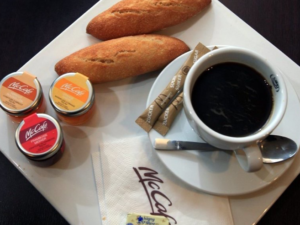While doing research for a global brand campaign we’re launching for one of our clients, we stumbled upon some notable brand adaptations in foreign countries. Which led us to wonder… would a Burger King burger taste as delicious if it were a Hungry Jacks burger instead? This “brand shock” should be familiar to those of you who’ve travelled or lived overseas only to find your go-to brands going by different names or taking a different approach with their products and marketing. This week adHOME took a look at brands that have globalized their market and what they’ve done to be successful.
Successful global companies adapt to local tastes, beliefs and value systems while remaining true to their company values and image. The term for this strategy is local specialization.
 McDonalds, for example, wanted to expand into France, but the food culture is very different than what you’d expect in the western world. The French like to take their time while eating, and the idea of fast food is repulsive to their culture. McDonalds combatted their “image” problem in France by opening fancy restaurants where people could sit down and enjoy their meals. They incorporated special products specific to France, such as French potatoes, cheeses and even macaroons to appeal to the local culture. The “glocal” approach McDonalds took helped to put them at #9 of Interbrand’s Best Global Brands of 2014.
McDonalds, for example, wanted to expand into France, but the food culture is very different than what you’d expect in the western world. The French like to take their time while eating, and the idea of fast food is repulsive to their culture. McDonalds combatted their “image” problem in France by opening fancy restaurants where people could sit down and enjoy their meals. They incorporated special products specific to France, such as French potatoes, cheeses and even macaroons to appeal to the local culture. The “glocal” approach McDonalds took helped to put them at #9 of Interbrand’s Best Global Brands of 2014.
Moving onto technology, Samsung has surpassed LG in most foreign markets, but not in India. Samsung chose to target the wealthier population with high-end products, because the income gap is wide between the rich and the poor. They thought it would be beneficial to position themselves as a premium brand, which aligns with their goals for the “Samsung” image. LG localized their products by making sure high and low income publics had access to them. They used India’s 16 official languages as leverage by producing on screen displays in all 16 languages. They also added built in cricket games to their televisions when they learned that cricket was one of the most popular games in India.
Samsung advertised on TV to reach their wealthy target public, while LG took to the streets and utilized “van marketing” to their advantage. By reaching consumers in rural areas and strategically localizing their product offering, they put themselves ahead of Samsung’s market share by almost double in 2014.

Dr. Hofstede, a psychologist renowned for his cultural research established 6 cultural dimensions that define national value systems and the attitudes of consumers in different countries. He categorizes certain cultures into these 6 different dimensions to help better understand what motivates them.
For example, indulgent cultures place higher importance on leisure and freedom of speech, where as restraint societies don’t place much importance on leisure and have restricted sexual norms and censorship laws. These dimensions explore in detail how personal needs are prioritized versus the needs and goals of the culture as a whole and how comfortable the culture is with changing the way they work. Hofstede’s cultural research has led the way for many companies in developing an effective global strategy. You can learn more about Hofstede and his research here.
As we collaborate here at adHOME to create a global campaign strategy, it’s important to keep in mind the fundamentals of branching out into new markets. Being specific about countries you’re reaching out to is important, as each have their own laws, cultural norms and business practices. A great place to start is by doing external research, but don’t neglect your internal data – it can tell you how much opportunity is available in these new markets, how easy it will be to integrate into the markets, and how much success you’ve had in the past. Third party data can’t answer these questions for you.
While brand consistency is important, different markets favour different sales and marketing approaches. In countries where relationships have a higher cultural value such as Japan, selling products through local partners achieve faster success. A big mistake many companies make is not letting local teams lead the way. Local agencies and resources will have a solid foundation of information on the market they typically operate in, so they should be directly involved in developing the brand to suit the market.
While there are no guarantees that your global business venture will be successful, taking the above steps and researching successful global campaigns will help keep you on the right track in developing an effective strategy, and ensure that this wont be your last venture into foreign markets.